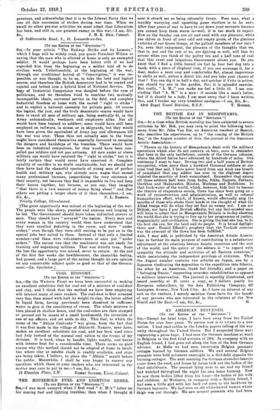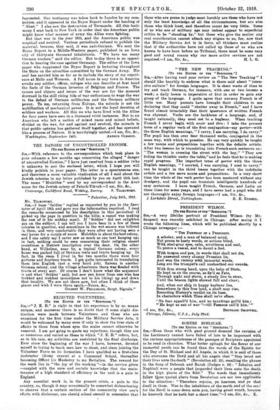AN AMERICAN RETURNED.
(To TEE EDITOR OF THE "SPECTATOR."] Sia,—Except for brief trips, I have been away from the United States for over four years. To return now is to return to a new nation. I had read cables in the London papers telling of the war unity throughout the United States. But I suspected these wera registering a pious hope. I had seen the German machine at work in Belgium in the first fatal autumn of 1914. In company with an English friend, I had gone out along the line of the first German advance. At Melte we had seen twenty-six Belgian peasants' cottages burned by German soldiers. We and several Belgian peasants were held prisoners overnight in a dirt-field opposite the burning cottages. The next morning the German stretcher-bearers came down the road, and house by house took out the bodies of the dead inhabitants. The peasant lying next to me and my friend had watched throughout the night his own home burning. Now he saw three bodies lifted from his home—the bodies of his wife and children. At Wetteren, in company with a British friend, I had seen a little girl with her back cut open to the backbone by German bayonets. We had seen an old white-haired woman whose thigh was cut through. We Hew several peasants who had been bayoneted. Our testimony was taken back to London by my com- panion, and it appeared in the Bryce: Report under the heading of " Alost." I also saw the destruction of Termonde. All this testi- mony I sent back to New York in order that the American public might know what manner of army the Allies were fighting. But that was in the year 1915, and the American public was sceptical and neutral. Various periodicals refused to publish the material, because, they said, it was anti-German. We sent the Bryce Report to a Middle-Western paper, published in an Iowa city of thirty-six thousand inhabitants. "We have too many German readers," said the editor. But to-day there is no opposi- tion to hearing the case against Germany. The editor of the Iowa paper who suppressed the Bryce Report is lecturing throughout the State on the atrocities committed by the German Army. His zeal has carried him so far as to include the story of my experi- ence at Melle and Weteren. A full house in any town in America awaits any soldier, officer, refugee who can describe at first band the facts of the German invasion of Belgium and France. The causes and objects and issues of the war are for the moment drowned in the still rising tide of war enthusiasm to wage the war to the defeat of German militarism and the German military power. To me, returning from Europe, the miracle is not the mobilization of mechanical power. It is not the loyal devotion of soldiers and workers. All this we who have lived with the Allies for four years have seen in a thousand vivid instances. But to an American who left a nation of mixed races and mixed beliefs, divided on the war, for and against and neutral, the miracle is that public opinion has gathered itself together, and has operated like a process of Nature. It is terrifyingly united.—I am, Sir, &c.,



































 Previous page
Previous page